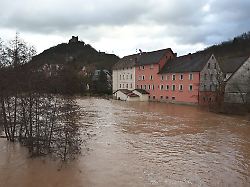First assess the damage
Ampel does not want to lower the debt brake because of flooding
January 3, 2024, 2:25 p.m
The corona pandemic and the Russian war of aggression against Ukraine are two extraordinary events that are used as the reason for the suspended debt brake. The current flood, however, is not the case, says the government spokesman. However, the step is not completely ruled out.
The federal government currently has no plans to suspend the debt brake this year due to the flood disaster in northern Germany. But she reserves the right to take such a step depending on further developments, said government spokesman Steffen Hebestreit in Berlin. If “a damaging event of national proportions with high amounts of damage” had to be dealt with, “the federal government would not shirk its responsibility,” added Hebestreit. There are “existing mechanisms” for this.
However, this does not mean that the federal government is currently prepared to suspend the debt brake because of the flood, the spokesman emphasized. First, the damage caused must be taken into account – but a result is not yet foreseeable: “If such a high amount of damage were to be incurred – which we are not assuming at the moment – then the federal government can also act.”
The Basic Law sets strict limits for the suspension of the debt brake, which limits the federal government’s annual new debt. According to the Basic Law, a suspension is permitted “in the event of natural disasters or extraordinary emergency situations that are beyond the control of the state.”
At this point in time, Hebestreit has rejected calls for more responsibilities for the federal government to be allocated to disaster control. It is currently clear that “disaster protection is very well positioned in this situation,” said the spokesman.
Countries organize disaster protection
Basically, “disaster protection is a state matter,” added Hebestreit – and the government has not yet seen any reason for a new regulation. The responsibility of the states has “a lot to do with the circumstances, with the local knowledge,” he said. “In this respect, the question of equipment is primarily a matter for the states, and the federal government can – and does – support.”
However, if the current flood situation gives reason to think about reorganizing responsibilities, “then we would certainly discuss that with each other,” said Hebestreit. For such a reorganization, however, the Basic Law would have to be changed.
